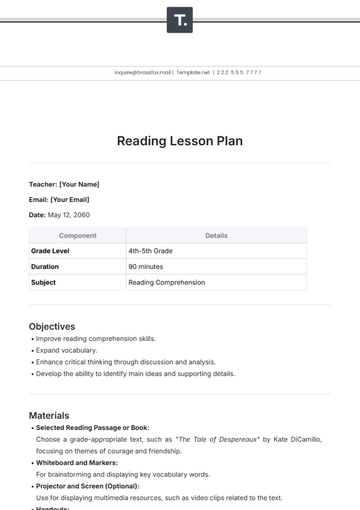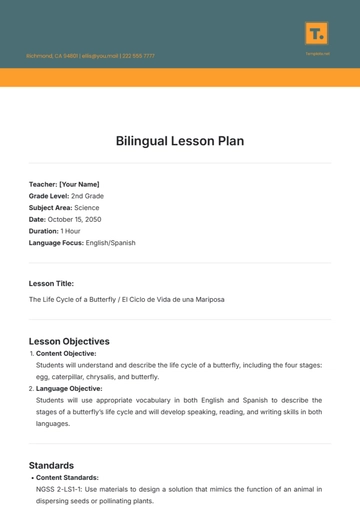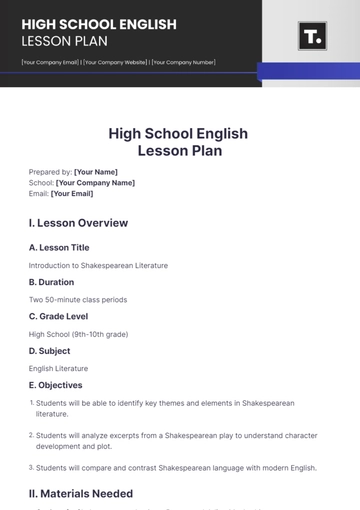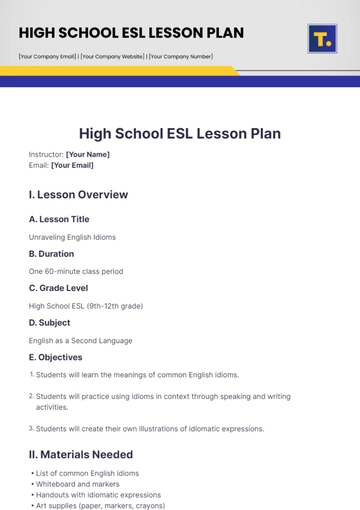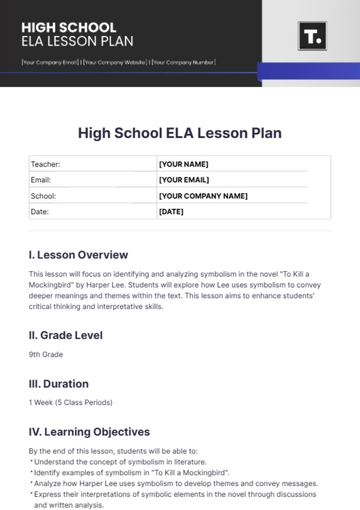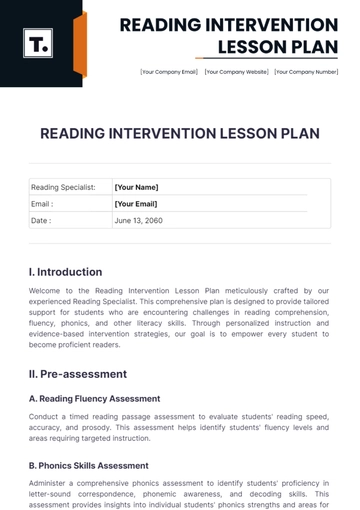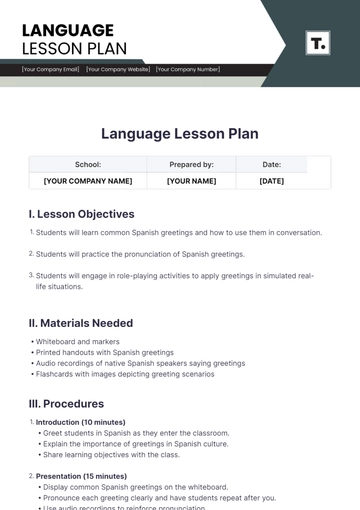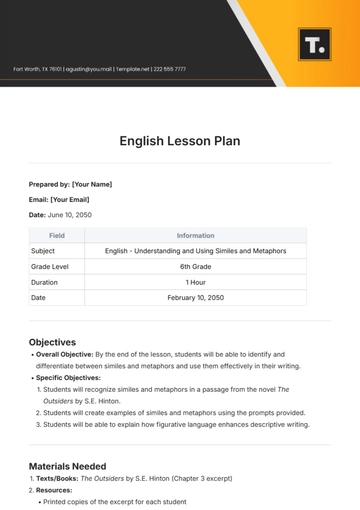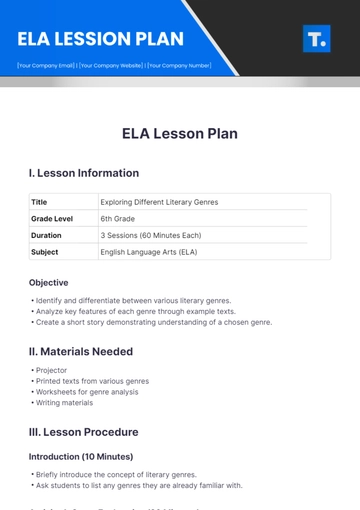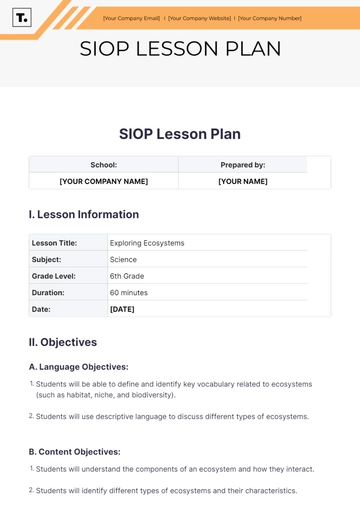Free High School English Lesson Plan
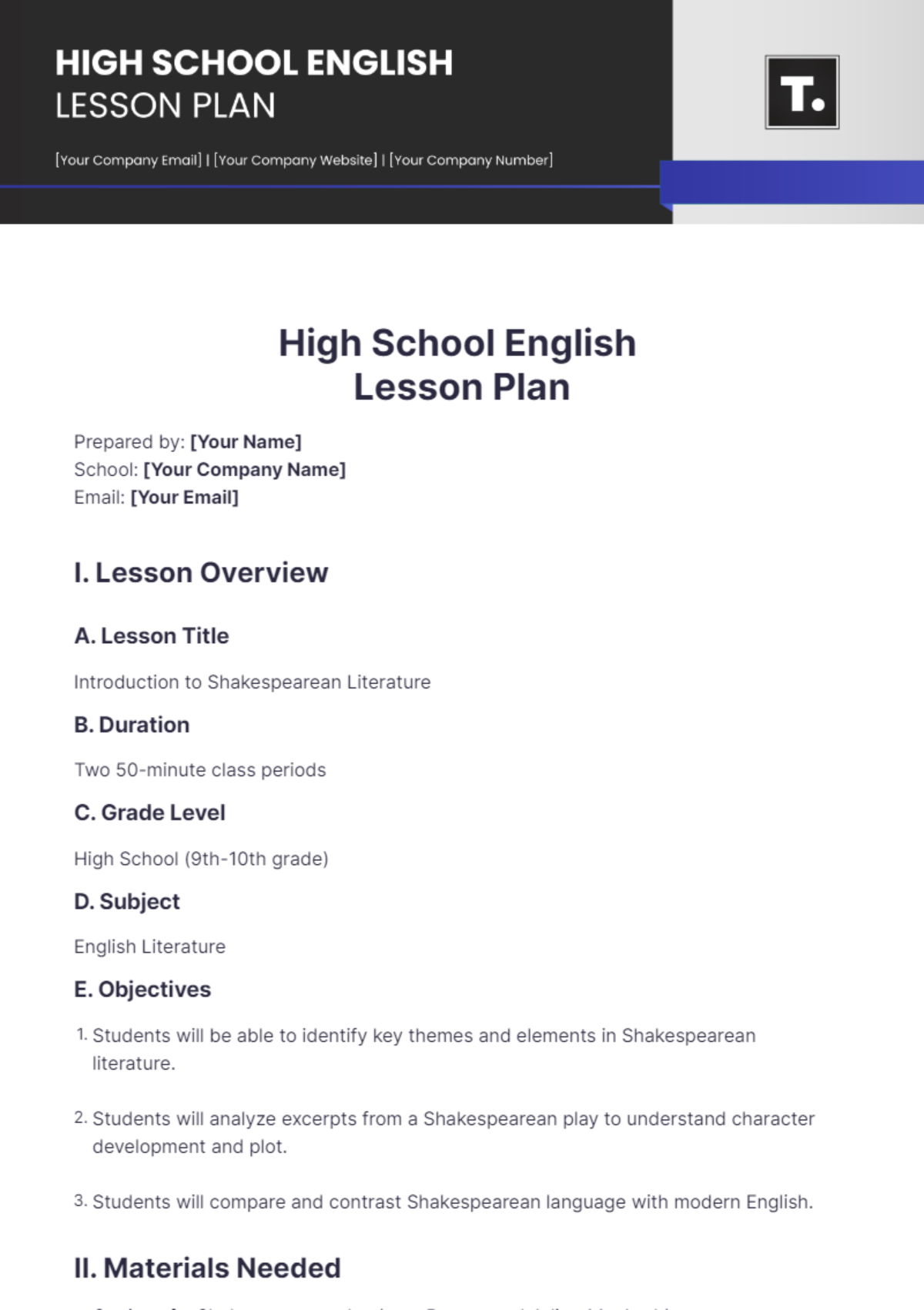
Lesson Plan
Prepared by: [Your Name]
School: [Your Company Name]
Email: [Your Email]
I. Lesson Overview
A. Lesson Title
Introduction to Shakespearean Literature
B. Duration
Two 50-minute class periods
C. Grade Level
High School (9th-10th grade)
D. Subject
English Literature
E. Objectives
Students will be able to identify key themes and elements in Shakespearean literature.
Students will analyze excerpts from a Shakespearean play to understand character development and plot.
Students will compare and contrast Shakespearean language with modern English.
II. Materials Needed
Copies of a Shakespearean play (e.g., Romeo and Juliet, Macbeth)
Projector and screen
Whiteboard and markers
Handouts with excerpts from the play
Computers or tablets with internet access
III. Procedure
Stage | Activity | Time |
|---|---|---|
Introduction | Opening Activity: Show a brief video clip introducing William Shakespeare and his contributions to literature. | 10 minutes |
Discussion: Lead a class discussion on what students already know about Shakespeare and his works. | 10 minutes | |
Exploration of Themes | Guided Reading: Provide handouts with excerpts from the chosen play highlighting different themes (e.g., love, ambition, fate). | 10 minutes |
Group Activity: Divide students into small groups and assign each group a theme. Have them analyze the excerpts and discuss how their assigned theme is portrayed. | 10 minutes | |
Analysis of Language | Vocabulary Review: Introduce common Shakespearean vocabulary words and phrases. | 10 minutes |
Close Reading: Select a passage from the play and guide students through a close reading, focusing on the language and its meaning. | 10 minutes | |
Character Study | Character Analysis: Choose a key character from the play and analyze their motivations, actions, and development throughout the story. | 10 minutes |
Group Discussion: Have students discuss their interpretations of the character and how they contribute to the play's overall themes. | 10 minutes | |
Comparison with Modern English | Modern Translation: Provide a modern translation of a passage from the play and compare it with the original text. | 10 minutes |
Discussion: Lead a discussion on the differences between Shakespearean language and modern English, emphasizing the beauty and complexity of Shakespeare's writing. | 10 minutes | |
Conclusion | Reflection: Ask students to reflect on what they have learned about Shakespearean literature and its relevance today. | 10 minutes |
Closing Activity: Assign a short writing prompt asking students to express their thoughts on why Shakespeare's works continue to be studied and performed. | 10 minutes |
IV. Assessment
Assessment is crucial to gauge students' understanding and engagement throughout the lesson. It allows educators to identify areas where students may need additional support and to celebrate their successes. The following assessment methods will be utilized:
Class participation during discussions and activities will be observed to assess engagement and understanding of the material.
The completion and quality of group work will be evaluated based on the depth of analysis and collaboration demonstrated.
Written reflections on the relevance of Shakespearean literature will provide insight into students' critical thinking skills and connections to the modern world.
A quiz on key themes, characters, and language elements from the play will assess students' comprehension and retention of the lesson content.
V. Extension Activities
Extension activities provide opportunities for students to deepen their understanding of the subject matter and explore related topics in greater depth. They also allow for differentiation based on students' interests and learning styles. In addition to the core lesson, students will have the option to participate in the following extension activities:
Watching a film adaptation of the play and comparing it to the original text will encourage students to analyze different interpretations and adaptations of Shakespearean works.
Researching the historical context of Shakespeare's plays will provide insight into the cultural and societal influences that shaped his writing.
Writing and performing scenes in Shakespearean style will allow students to creatively engage with the language and themes of the play.
Hosting a Shakespearean-themed debate or mock trial will foster critical thinking and public speaking skills while exploring ethical dilemmas and moral questions raised in the play.
VI. References
Shakespeare, William. Hamlet. Edited by Harold Jenkins, Bloomsbury Arden Shakespeare, 2006.
Norton, Michael, and Jeffrey Masten. "Shakespeare and Early Modern Drama." The Cambridge Companion to Shakespearean Drama, edited by Arthur F. Kinney, Cambridge University Press, 2003, pp. 52-68.
Bloom, Harold. Shakespeare: The Invention of the Human. Riverhead Books, 1998.
- 100% Customizable, free editor
- Access 1 Million+ Templates, photo’s & graphics
- Download or share as a template
- Click and replace photos, graphics, text, backgrounds
- Resize, crop, AI write & more
- Access advanced editor
Enhance your English curriculum with the High School English Lesson Plan Template from Template.net. This downloadable and printable template provides a structured yet flexible framework for teaching complex literary concepts and language skills. Customizable and editable in our AI Editor Tool, it allows educators to create engaging lessons that cater to diverse learning styles and academic levels, fostering a deeper appreciation for literature and effective communication.
